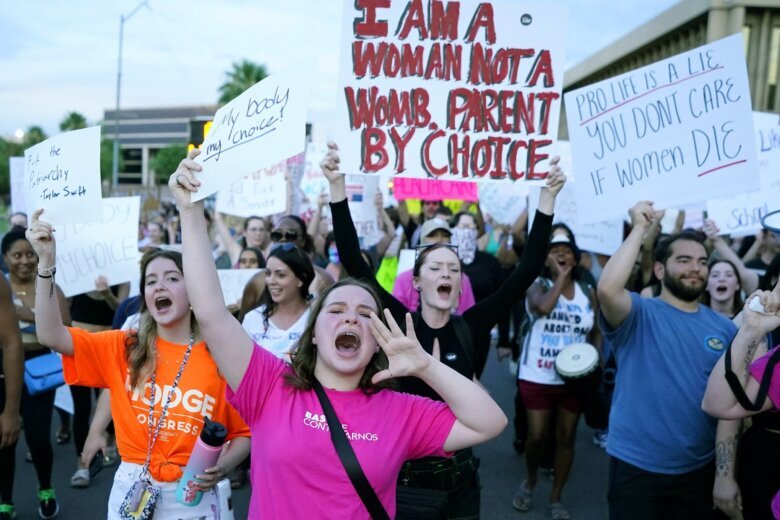
The Texas Supreme Court received a lot of attention this week when it rejected a woman’s request for an immediate abortion there due to harrowing pregnancy complications.
It’s one of several Western states where there have been developments and court arguments this week in lawsuits over state abortion policies.
In some cases, plaintiffs are trying to end the abortion bans most Republican-controlled states have begun enforcing since last year. In others, the quest is for clarity about exceptions that could come into play in a small portion of pregnancies.
Some things to know about the cases:
TEXAS COURT RULES AGAINST ABORTION REQUEST
One short-lived Texas case may be the most watched of all the abortion ban lawsuits.
Last week, Katie Cox sued for the right to end her pregnancy. When she filed, the mother of two was 20 weeks pregnant with a fetus expected to die in utero or shortly after birth. She said carrying a baby to term would also risk her health and future fertility.
On Monday, the Texas Supreme Court denied the request, saying she didn’t qualify for the exceptions to the abortion bans in state law.
By the time the ruling came down, her doctors said she had already traveled to another state to obtain an abortion.
Also this week, lawyers said a Kentucky woman who filed a similar challenge to her state’s ban had learned the embryo she was carrying no longer had cardiac activity.
IDAHO WOMEN ALSO SEEKING CLARITY ON EXCEPTIONS
A lawyer for the state of Idaho made a case Thursday in Boise for dismissing a lawsuit that challenges the state’s ban.
Like lawsuits in Tennessee and Texas, the plaintiffs are women who could not get abortions in their states despite pregnancies that had serious health risks for them, their fetuses or both. The women are not seeking to overturn the entire abortion ban but rather to clarify how exceptions to save the lives of pregnant women should be applied.
The state contended that the case should move ahead because it was based on hypothetical future scenarios. The plaintiffs said the opposite: That these are real situations facing doctors now — and the vagueness is harming women.
The plaintiffs all wanted to end pregnancies in which doctors told them they were likely to have miscarriages or deliver babies who would likely die soon after birth.
All four of them traveled to Oregon or Washington. Three of them received abortions and one delivered a stillborn baby.
OHIO PROVIDERS CALL FOR BAN TO BE STRUCK DOWN AFTER VOTE
After Ohio’s ban on abortions after cardiac activity can be detected — generally at six weeks’ gestation and before women often know they’re pregnant — took effect last year, abortion providers sued to have it struck down, arguing it violated the state constitution.
A judge eventually put enforcement on hold while the case advanced through the courts.
Last month, Ohio voters approved amending the state constitution to enshrine the right to for people to make their own reproductive decisions. The amendment became official this month.
But the Republican-controlled state Legislature has not yet rolled back the ban. In fact, some Ohio GOP lawmakers have vowed to block the amendment from lifting existing abortion restrictions.
On Thursday, the abortion providers filed a new request for courts to throw out the state’s bans, noting that the amendment has taken effect.
STATE AND LOCAL LAWS CLASH IN NEW MEXICO
There are no restrictions in Democrat-controlled New Mexico on when in pregnancy abortion is allowed, and the state has become a haven for people from neighboring Texas, where nearly all abortions are illegal, to get them.
But some conservative city and county governments have passed their own restrictions. Gov. Michelle Lujan Grisham earlier this year signed a bill that overrides local restrictions that were adopted in Lea and Roosevelt counties and the cities of Hobbs and Clovis.
The state supreme court heard arguments Wednesday on whether they have the right to do so.
Justices have not indicated when they’ll rule.
DOES WYOMING NEED A TRIAL?
A judge heard arguments Thursday on whether to decide now on Wyoming’s abortion bans or let a challenge to the laws go to trial in the spring.
Challenges to laws banning abortion at all stages of pregnancy and the nation’s first explicit prohibition on use of medication to end pregnancy are before Teton County District Judge Melissa Owens, who has blocked the laws from being enforced while they are disputed in court.
Advocates on both sides have asked Owens to rule based on the law rather than holding a trial that’s scheduled to start in April. Any ruling from her would likely be appealed to the Wyoming Supreme Court.
Owens didn’t immediately make a decision after Thursday’s arguments.
The state’s high court this week also heard arguments from lawyers for some lawmakers who oppose abortion rights and Right to Life Wyoming who are seeking to join in the defense of the bans alongside the state attorney general.
The state has just one clinic that provides abortions with both medication and surgery. The Casper clinic opened in April, after a nearly yearlong delay because of damage from an arson attack. A second, in Jackson, which provides only medication abortion, is closing this week because of high rent and other costs.
ARIZONA COURT CONSIDERS WHICH BAN IS IN EFFECT
Justices on the Arizona Supreme Court on Tuesday grilled lawyers about whether a territorial abortion ban adopted in 1864, nearly a half-century before it became a state, is still fully in effect — or if key parts have been superseded by a new law adopted last year.
A state appeals court previously ruled that because of newer restrictions, physicians cannot be prosecuted for providing abortions in the first 15 weeks of pregnancy, but other people can be.
A lawyer representing the director of anti-abortion counseling centers said the lower court got it wrong and that the old ban still applies to doctors, too, and that the 15-week law allows abortions during that time only to save the life of the pregnant woman.
Lawyers for the state government and Planned Parenthood of Arizona disagree.
While the court considers the case, advocates are trying to get a measure on the ballot next year to enshrine the right to abortion in the state constitution.
SUPREME COURT WILL HEAR ABORTION DRUG CASE NEXT YEAR
The U.S. Supreme Court said Wednesday that it will take up an abortion case in its current term, which will run until late June or early July.
The case is on whether mifepristone, one of the two drugs used in combination for most medication abortions, was properly approved by federal regulators.
An appeals court’s ruling would cut off access to the drug through mail and impose other restrictions.
The arguments will be the first before the highest court in the U.S. on abortion since Dobbs v. Jackson Women’s Health Organization last year. That was the case in which the court undid the right to abortion that justices had found nearly 50 years earlier in Roe v. Wade, sparking the wave of laws and lawsuits.
Copyright © 2025 The Associated Press. All rights reserved. This material may not be published, broadcast, written or redistributed.








